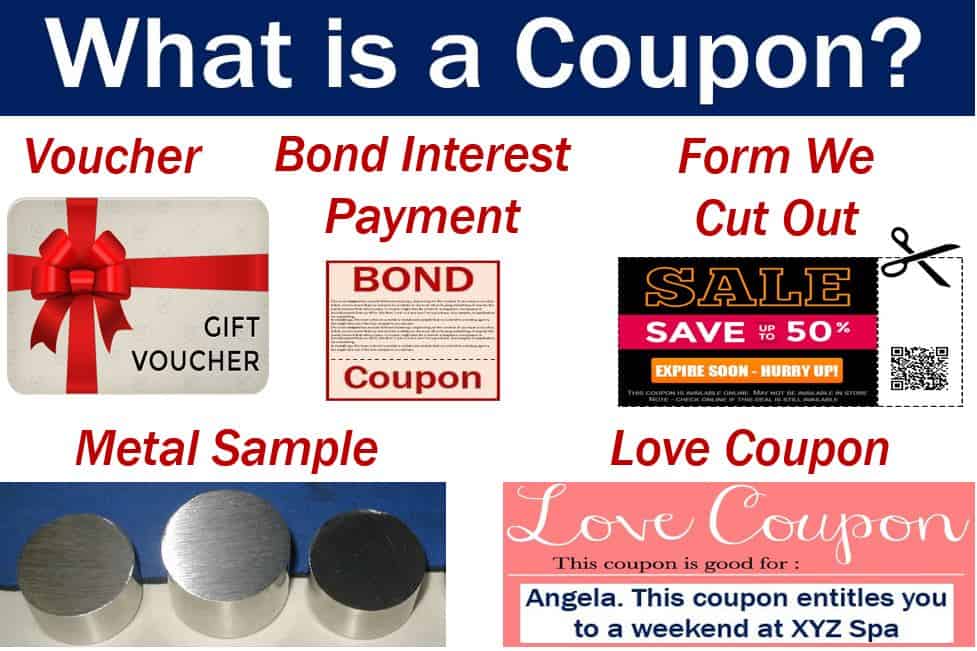The word Coupon has several different meanings, depending on the context. It can mean a voucher, ticket, or document that we redeem for a rebate or discount when buying something. It may be the yearly interest that a bond pays. A coupon might also be a form in a magazine, newspaper, or advertisement that we fill in. We then cut it out and send it for purchase, a free sample, or an application for something.
In metallurgy, the term refers to a metal or metalwork sample that we submit to a testing agency. We might also send the free sample to a customer. So what types of coupons are there and how do you use a coupon accordingly?
In the digital age, coupons have evolved into electronic codes, which consumers can redeem online for discounts, rewards, or to access special offers, streamlining the traditional process of cutting out and mailing paper coupons.
Etymology of coupon
According to the Etymology Online Dictionary, the term first appeared in the English language meaning a ‘certificate of interest due on a bond’ in 1822. It was a certificate that the owner could cut from the bond and present for payment.
The word came from French Coupon, which means ‘a piece cut off.’ Couper in French means ‘to cut,’ while Coup means a ‘blow.’ In the 1860s, British travel agent Thomas Cook started using the term ‘discount ticket.’
It was not until 1906 that its meaning also widened to include forms or adverts that people filled in.

Today, studies show that the strategic use of coupons can significantly influence consumer purchasing decisions, often driving sales in targeted product categories.
Coupon on a bond
A coupon payment on a bond is a quarterly, half-yearly, or annual interest payment. Bondholders receive the payments during the bond’s life. In other words, from when they bought it until it matures.
Historically, bond issuers issued them in the form of bearer certificates. In a bearer certificate, there was no owner’s name. However, whoever was in possession of it is legally the owner. In fact, to confirm proof of ownership, all you had to do was present the document.
The issuer attached several coupons to the certificate, one for each payment.
On each one’s due date, the owner would tear it off and present it for payment. The act of tearing it off was known as ‘clipping the coupon.’
Zero-coupon bonds
Some bonds, however, such as zero-coupon bonds, have no coupons. These bonds make just one payment – the payment of the face value on their maturity date.
The coupon rate, when referring to a bond, is the annual interest rate. In most cases, the issuer pays the interest on a semiannual basis.

The rate is stated when the bond is issued until it reaches maturity. Bonds are types of IOUs or debts that governments, municipalities, and companies sell and people purchase.
We commonly use the terms coupons and vouchers interchangeably today. However, technically there is a difference in their usage.
Test coupon
A test coupon is a printed circuit board we use when testing the quality of a PWB fabrication process. PWB stands for printed wiring board. They are fabricated on the same panel as PWBs, usually at the edges.
People must make sure that the layers align properly. They must also ensure that all the circuits connect correctly.
Compound phrases with “coupon”
A compound phrase is a term which contains two or more words. “Coupon rate,” for example, is a compound phrase. Let’s look at some which contain the word “coupon”:
Coupon Code
A series of letters and/or numbers that consumers can enter at checkout to receive a discount or benefit.
For example: “I saved 20% on my purchase by using the coupon code at checkout.”
Coupon Book
A collection of coupons provided in book form, usually offering discounts on a variety of products or services.
For example: “The local charity sold coupon books as a fundraiser, and I got great deals at restaurants and stores.”
Coupon Campaign
A marketing strategy that involves the distribution of coupons to increase sales or promote a new product.
For example: “The company launched a coupon campaign to attract new customers to their online store.”
Coupon Redemption
The process of using a coupon to receive the discount or offer that it provides.
For example: “The store’s coupon redemption rate increased after they advertised the promotion in the local paper.”
Coupon Exchange
A system or event where individuals can trade coupons with others.
For example: “I attended a coupon exchange at the community center and swapped my extra grocery coupons for ones I’ll actually use.”
Coupon Barrier
In finance, a certain threshold or condition that must be met for a coupon to be paid or activated in structured products.
For example: “The bond had a coupon barrier set at an inflation rate of 2%, ensuring that the coupon would only be paid if inflation exceeded that level.”
‘Coupon’ in other languages: Cupón (Spanish), Cupom (Portuguese), Buono (Italian), Coupon (French), Coupon (German), Купон (Russian), Kupong (Swedish, Indonesian, Malay, Filipino, Polish), Kupón (Czech), クーポン (Japanese), 优惠券 (Chinese), Cheti (Swahili), كوبون (Arabic), कूपन (Hindi), and কুপন (Bengali).
